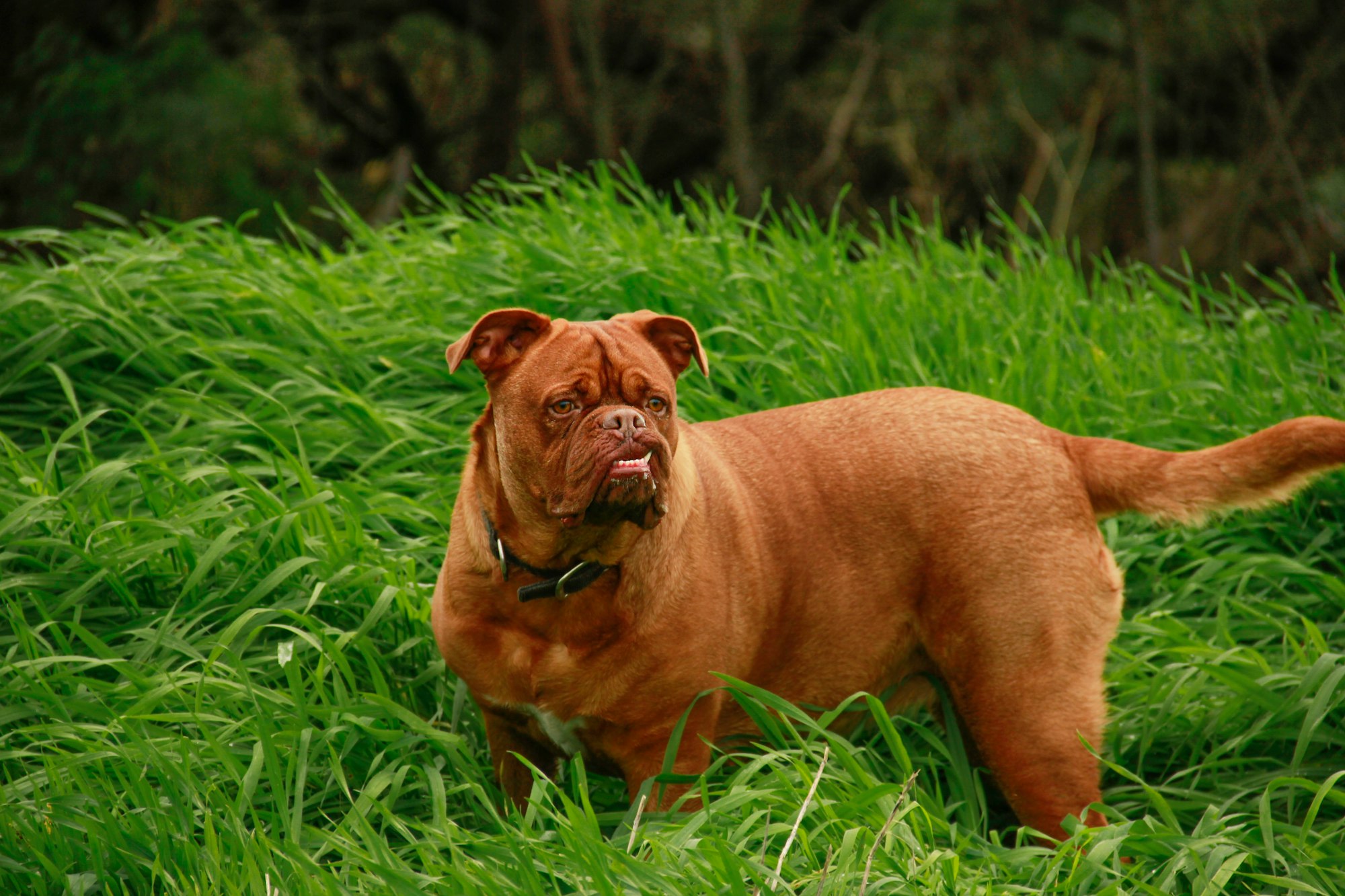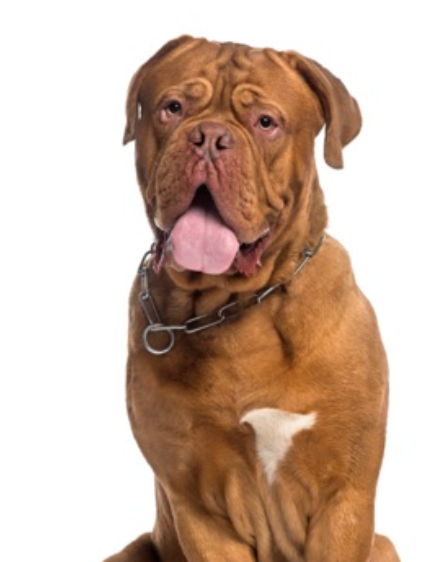The French Mastiff, also known as the Dogue de Bordeaux, is a large and powerful breed of dog that originated in France. They are known for their massive size, wrinkled face, and powerful build. The breed was traditionally used for guarding and hunting, but today they are more commonly kept as loyal companions.
French Mastiffs typically weigh between 120-145 pounds and stand at a height of 23-27 inches at the shoulder. They have a short, smooth coat that can be found in various shades of fawn, from light to dark. Their wrinkled face and muscular build give them an imposing appearance, but they are known for their gentle and loving nature towards their families.
French Mastiffs are generally good with children and other pets, although they can be protective and territorial, especially towards strangers. They require socialization and training from a young age to ensure they are well-behaved and obedient. They are also known for their snoring, drooling, and flatulence, which may be a consideration for potential owners.
Like all large breeds, French Mastiffs are prone to certain health issues, including hip and elbow dysplasia, bloat, and heart conditions. It's important to purchase a puppy from a reputable breeder who tests their breeding stock for these conditions and provides proper care and socialization for their puppies.
The French Mastiff is a loyal and affectionate breed that can make a great companion for the right owner who is willing to provide them with the care and attention they need.

What are the Characteristics of French Mastiff?
The Dogue de Bordeaux, also known as the French Mastiff, is a large and powerful breed of dog with several distinguishing characteristics. Here are some of the main characteristics of this breed:
- Appearance: The Dogue de Bordeaux has a massive and muscular body with a large head, broad shoulders, and a short, smooth coat that comes in shades of fawn. They have a wrinkled face with a prominent jaw and droopy jowls, giving them a distinctive appearance.
- Temperament: While the Dogue de Bordeaux is a loyal and affectionate dog with its family, it can be wary and protective of strangers. This makes them excellent watchdogs, but it also means they require early socialization and training to ensure they are well-behaved and don't become overly aggressive.
- Health: As with all breeds, the Dogue de Bordeaux is prone to certain health issues, such as hip dysplasia, elbow dysplasia, bloat, and heart conditions. Responsible breeders will screen their breeding stock for these conditions and provide appropriate care to ensure their puppies are healthy.
- Exercise: Despite their size, the Dogue de Bordeaux doesn't require a lot of exercise. They enjoy short walks and play sessions, but are generally content to lounge around the house with their family.
- Training: Due to their protective nature, early socialization and training are essential for the Dogue de Bordeaux. They respond well to positive reinforcement training methods and need a firm, consistent handler who can establish themselves as the pack leader.
- Grooming: The Dogue de Bordeaux's short coat requires minimal grooming, but they do shed and may require occasional brushing to keep their coat looking shiny and healthy.
How to take care of French Mastiff?
The French Mastiff, or Dogue de Bordeaux, is a large and powerful breed of dog that requires proper care and attention to maintain their health and well-being. Here are some tips on how to take care of your French Mastiff:
- Nutrition: French Mastiffs require a healthy and balanced diet that provides them with the necessary nutrients to support their growth and development. Feeding them high-quality dog food that is appropriate for their size and age is essential. You should also avoid overfeeding them, as obesity can lead to health problems.
- Exercise: While French Mastiffs do not require a lot of exercise, they still need regular activity to keep them healthy and prevent boredom. Daily walks, play sessions, flirt pole play and outdoor activities are beneficial for their physical and mental well-being.
- Grooming: The short coat of the French Mastiff requires minimal grooming, but they do shed and may benefit from occasional brushing to remove loose hair and maintain their coat's shine. They also require regular ear cleaning and dental care to prevent infection and tartar buildup.
- Training: French Mastiffs are intelligent and trainable dogs that require early socialization and obedience training to ensure they are well-behaved and obedient. Positive reinforcement techniques, such as reward-based training, are recommended.
- Health care: Regular veterinary check-ups are essential to maintain your French Mastiff's health and detect any potential health issues early. They also require regular vaccinations, flea, tick, and heartworm prevention, and dental care.
- Environment: French Mastiffs are indoor dogs and require a comfortable and safe living environment with adequate space to move around. They also require access to clean water and a comfortable resting area.

What are the health issues that can be in French Mastiff?
As with any breed, French Mastiffs can be prone to certain health problems. Some of the most common health issues that may affect this breed include:
- Hip and Elbow Dysplasia: French Mastiffs may develop hip and elbow dysplasia, which is a genetic condition that affects the development of the hip and elbow joints. This can lead to discomfort, pain, and mobility issues.
- Bloat: Bloat, also known as Gastric Dilatation-Volvulus (GDV), is a life-threatening condition that occurs when the stomach fills with gas and twists on itself. This can lead to a loss of blood flow to the stomach and other organs, which can be fatal if not treated promptly.
- Heart Conditions: Some French Mastiffs may develop heart conditions such as dilated cardiomyopathy, which is a condition that affects the heart's ability to pump blood effectively.
- Eye Problems: French Mastiffs may be prone to certain eye problems such as entropion, ectropion, and cherry eye. These conditions can cause irritation, redness, and discomfort in the eyes.
- Skin Problems: French Mastiffs may be prone to skin problems such as allergies, hot spots, and infections. These conditions can cause itchiness, redness, and discomfort in the skin.
It's important to purchase a puppy from a reputable breeder who tests their breeding stock for these conditions and provides proper care and socialization for their puppies. Regular veterinary check-ups and preventative care can also help detect and manage any potential health issues early on.
What are the Special Considerations for French mastiff?
The French Mastiff, or Dogue de Bordeaux, is a large and powerful breed of dog with some special considerations that potential owners should keep in mind. Here are some of the special considerations for owning a French Mastiff:
- Size and Strength: French Mastiffs are a large and powerful breed, which means they require plenty of space to move around and exercise. They can also be quite strong, so it's important to ensure that you can handle them physically and provide proper training and socialization to prevent any potential behavior problems.
- Health Issues: As mentioned earlier, French Mastiffs can be prone to certain health issues. It's important to purchase a puppy from a reputable breeder who tests their breeding stock for these conditions and provides proper care and socialization for their puppies. Regular veterinary check-ups and preventative care can also help detect and manage any potential health issues early on.
- Temperament: While French Mastiffs are known for their loyalty and affection towards their family, they can be wary of strangers and other animals. Early socialization and training are essential to ensure they are well-behaved and don't become overly aggressive.
- Training: French Mastiffs are intelligent and trainable dogs that require early socialization and obedience training to ensure they are well-behaved and obedient. Positive reinforcement techniques, such as reward-based training, are recommended.
- Grooming: While French Mastiffs have a short coat that requires minimal grooming, they do shed and may benefit from occasional brushing to remove loose hair and maintain their coat's shine. They also require regular ear cleaning and dental care to prevent infection and tooth decay.
- Living Environment: French Mastiffs are indoor dogs and require a comfortable and safe living environment with adequate space to move around. They also require access to clean water and a comfortable resting area.
Owning French Mastiff requires a commitment to providing proper care, training, and socialization to ensure they are healthy, happy, and well-behaved companions.
What are the Diet and Nutrition of french mastiff?
The French Mastiff, or Dogue de Bordeaux, requires a healthy and balanced diet to maintain their overall health and well-being. Here are some general guidelines for the diet and nutrition of French Mastiffs:
High-quality dog food: Choose a high-quality dog food that is specifically formulated for large breeds, as French Mastiffs are prone to obesity and other health issues. Look for dog food that contains high-quality sources of protein, complex carbohydrates, and healthy fats.
- Portion control: French Mastiffs are prone to overeating, so it's important to control their portion sizes to prevent obesity. You should follow the feeding guidelines on the dog food package, and monitor your dog's weight and body condition regularly to make sure they are not gaining too much weight.
- Avoid table scraps and human food: French Mastiffs should not be fed table scraps or human food, as it can lead to obesity, digestive issues, and other health problems.
- Treats: Treats can be given in moderation as a form of positive reinforcement during training, but they should not make up more than 10% of your dog's daily caloric intake.
- Water: Always provide your French Mastiff with fresh, clean water to prevent dehydration and ensure their overall health.
- Supplements: Depending on your French Mastiff's individual needs, they may benefit from supplements such as glucosamine and chondroitin to support joint health, omega-3 fatty acids for skin and coat health, and probiotics to support digestive health.
It's always best to consult with your veterinarian to determine the appropriate diet and nutrition for your French Mastiff based on their individual needs, age, and activity level.

Conclusion
The French Mastiff, also known as the Dogue de Bordeaux, is a large and powerful breed of dog that originated in France. They are known for their loyalty and affection towards their family, and their protective nature makes them excellent watchdogs. However, potential owners should be aware of the special considerations that come with owning a French Mastiff, such as their size and strength, health issues, temperament, training needs, grooming requirements, and living environment.
French Mastiffs are a large breed, typically weighing between 110 and 150 pounds, and standing between 23 and 27 inches tall at the shoulder. They have a muscular build, a short, dense coat that comes in shades of fawn or mahogany, and a distinctive wrinkled face with a large head and jowls. They require plenty of space to move around and exercise, so a large living environment with access to a secure yard is recommended.
French Mastiffs can be prone to certain health issues, such as hip and elbow dysplasia, bloat, heart conditions, eye problems, and skin problems. It's important to purchase a puppy from a reputable breeder who tests their breeding stock for these conditions and provides proper care and socialization for their puppies. Regular veterinary check-ups and preventative care can also help detect and manage any potential health issues early on.
French Mastiffs have a protective and loyal nature towards their family, but they can be wary of strangers and other animals. Early socialization and obedience training are essential to ensure they are well-behaved and don't become overly aggressive. Positive reinforcement techniques, such as reward-based training, are recommended.
While French Mastiffs have a short coat that requires minimal grooming, they do shed and may benefit from occasional brushing to remove loose hair and maintain their coat's shine. They also require regular ear cleaning and dental care to prevent infection and tartar buildup.
French Mastiffs require a healthy and balanced diet to maintain their overall health and well-being. Choose a high-quality dog food that is specifically formulated for large breeds, control their portion sizes to prevent obesity, and avoid feeding them table scraps or human food. Treats can be given in moderation as a form of positive reinforcement during training, but they should not make up more than 10% of your dog's daily caloric intake.
Overall, owning a French Mastiff requires a commitment to providing proper care, training, and socialization to ensure they are healthy, happy, and well-behaved companions. With proper care and attention, a French Mastiff can be a loyal and loving addition to your family.

